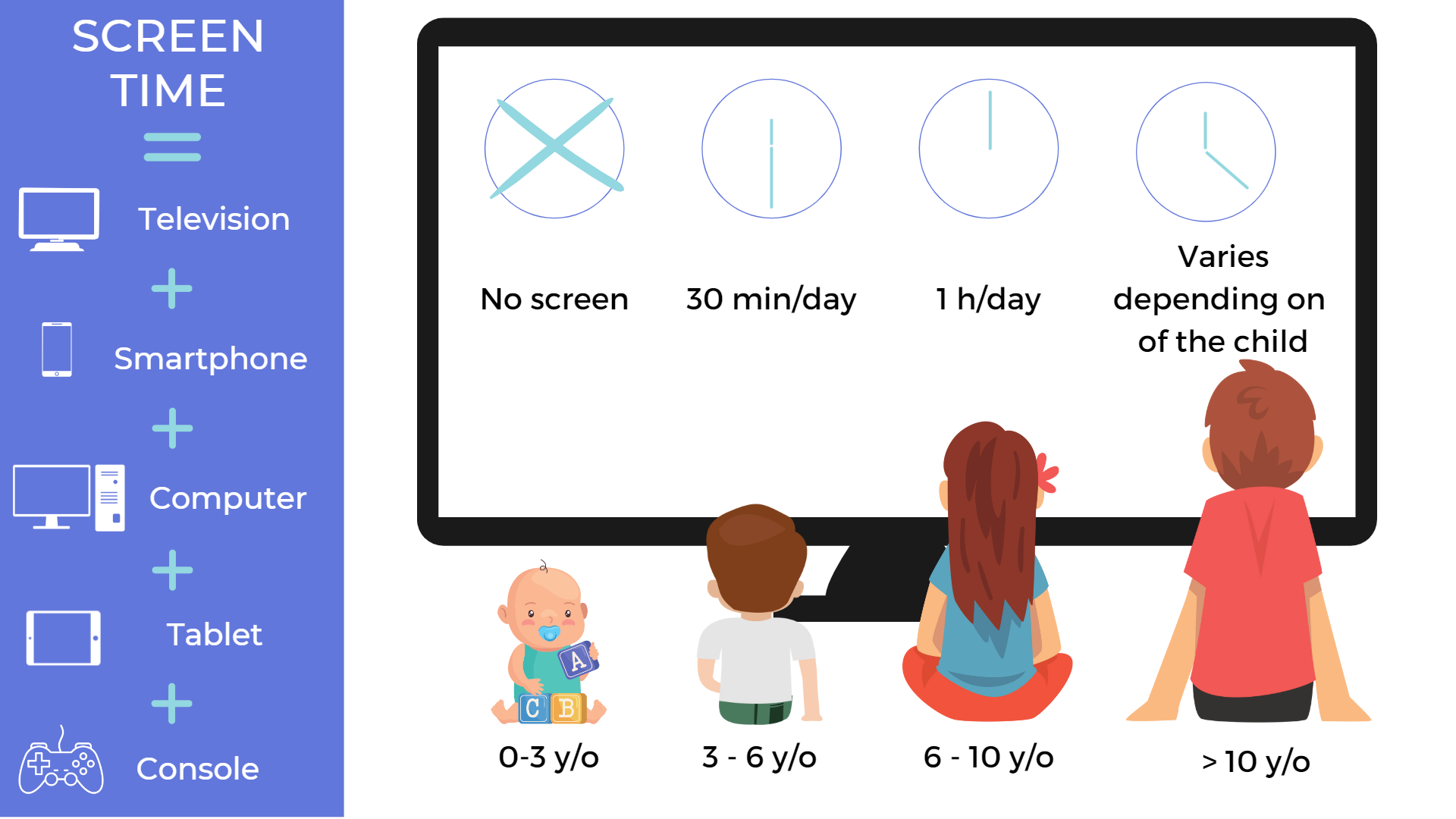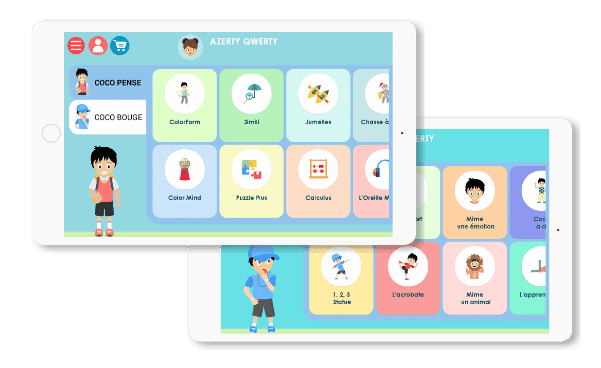In today’s world, the use of screens has become ubiquitous, and it is increasingly difficult to do without them. However, excessive or inappropriate use of screens can have adverse effects on the mental, physical and social health of individuals, especially children. That’s why it’s important to establish clear rules for screen use to ensure healthy and balanced use. These rules may vary depending on the age, context and needs of each individual, but they must be simple, understandable and consistent to be effective.
In this introduction, we will explore why it is important to establish clear rules for screen use, key considerations for establishing these rules, and parental supervision.
How should clear rules be established for the use of screens?
Assessing individual needs
Before setting rules for screen use, it is important to understand the needs and habits of each family member. Children have different needs than adolescents and adults, and these needs may vary depending on their age, development and environment. For example, young children need social and physical interaction to develop, and excessive screen use can hinder this development. Teens, on the other hand, may use screens to connect with peers and relax, but excessive use can affect their mental health and emotional well-being. Adults may use screens for work and play, but excessive use can also affect their physical and mental health. By assessing individual needs, parents can tailor screen use rules to meet the needs of each family member.
Define time limits
Screens can be a source of distraction and stress, especially for children and teens. Experts recommend that children spend less than two hours a day in front of a screen, and that adults limit their screen time in their free time. It is important to set clear limits on screen time to avoid excessive use. Parents can set a schedule for screen use, such as limiting screen time during the week and allowing extra time on weekends. Parents can also use parental control applications to limit screen time and monitor their children’s online activity.

Establish rules of place
Displays can be used in many different places, but it is important to establish rules of place to encourage healthy and responsible use. For example, electronic devices may not be allowed to be used at the table during meals or in bedrooms to avoid excessive use and disrupt sleep. Parents can also encourage the use of screens in common areas, such as the living room or kitchen, to make it easier to supervise children’s online activity.
Encourage alternative activities
To reduce screen time, it is important to offer alternatives for leisure activities, such as sports, board games, or simply spending time with family and friends. Parents can organize regular family activities, such as outings or outdoor play, to encourage balanced screen use. Parents can also encourage children to pursue their interests and passions, such as reading or music, to reduce their screen time and promote a healthy, active lifestyle.
How important is communication and negotiation with children to establish rules that work for everyone?
Communication and negotiation are key to establishing clear rules for screen use that work for all family members. Children need to understand why the rules have been set and what is expected of them in terms of screen use. Parents must also be sensitive to their children’s needs and be willing to negotiate to find a compromise that works for everyone.
The use
For example, if a child needs to use a computer to do homework, parents can set rules to limit the amount of time the child spends playing online games, but allow additional computer use for homework. If a teenager needs to use social media to stay in touch with friends, parents can set a rule to limit time spent on social media, but agree to increase time spent on social media during school breaks.

Listening
It is also important for parents to listen to their children’s concerns about the rules of screen use. If a child becomes frustrated or angry about the rules, parents must be willing to listen and negotiate to find a solution that works for everyone. Open communication can help build trust between parents and children and encourage responsible screen use.
In short, communication and negotiation are essential to establish rules for screen use that work for all family members. Parents must be willing to listen to their children’s needs and concerns and negotiate to find compromises that encourage responsible screen use. Rules must be clear, consistent and tailored to the individual needs of each family member to ensure healthy and balanced screen use.
How can parents supervise their children’s screen use without violating their privacy?
For example, parents can install parental control software on their children’s computers and mobile devices to limit access to certain inappropriate websites and applications. They can also use content filters to block inappropriate content, such as pornographic or violent websites. Parents can also monitor their children’s online conversations by installing instant messaging, email or social networking monitoring software.
However, it is important for parents to communicate clearly with their children about why they are using these supervision tools and the limitations of using these tools. Children have a right to privacy, and parents must respect their personal space and trust. Parents should explain to their children that these tools are used for their safety and well-being and will not be used to violate their privacy or intimacy.
Parents need to establish clear and consistent rules for screen use with their children. Children need to understand what is expected of them in terms of screen use and what the consequences are for not following the rules. Parents can also involve their children in the decision-making process about screen use by giving them a voice and an opportunity to provide input.
They can supervise their children’s screen use without violating their privacy by using specific tools and techniques, while clearly communicating with their children and establishing consistent rules for screen use. Trust and open communication between parents and children are essential to ensure healthy and balanced screen use.
How important is it to educate parents about the potential dangers of screen use and how to reduce the associated risks?
Educating parents about the potential dangers of children’s screen use is essential to enable them to take preventative measures to protect their children’s health and well-being. The dangers associated with excessive screen use can include obesity, sedentary lifestyle, sleep problems, social isolation, attention problems and addiction.
Parents should be aware of
Parents need to be aware of these risks and the importance of limiting their children’s screen time. This can be done by setting screen time limits for children, encouraging alternative activities, such as physical activities and board games, and avoiding using screens as a reward or punishment.
In addition, parents need to be aware of online safety risks, such as online harassment, online scams, exposure to inappropriate content and cyberbullying. Parents need to educate their children on how to protect themselves online, teaching them not to share personal information, report inappropriate behavior, and avoid face-to-face meetings with people they have met online.
Using the software
Parents can also use parental control software to monitor their children’s screen use, blocking access to certain inappropriate websites and applications, monitoring online conversations and setting clear usage rules. It is important that parents communicate clearly with their children about the use of these surveillance tools and respect their children’s privacy.
Finally, parents can encourage healthy behaviors by using positive role models regarding screen use. They themselves can limit their own screen use and spend time with their children without screens, such as board games or outdoor activities.
Ultimately, educating parents about the potential dangers of screen use among children is essential to protect their health and well-being. Parents can take preventive measures to reduce the risks associated with excessive screen use by setting limits on screen time, encouraging alternative activities and using monitoring tools. Parents also need to be positive role models for their children’s screen use.
The importance of a regular break
It is extremely important for children to take regular breaks during screen use. Spending long hours looking at a screen can cause eye strain, headaches, neck and shoulder pain, and other long-term health problems. In addition, screens can have a negative impact on children’s sleep by disrupting their circadian rhythm and increasing their time to sleep. Therefore, it is recommended that parents set rules regarding screen use and encourage their children to take frequent breaks to rest their eyes, stretch and engage in other physical and social activities.
Screen awareness
Children’s screen awareness is a crucial aspect of their education and development. With the ubiquity of screens in our daily lives, it is important that children learn to use screens appropriately and responsibly. This includes understanding the potential risks associated with excessive screen use, such as addiction, sleep problems, attention problems and mental health issues. Parents, teachers and health professionals have an important role to play in educating children about screens. By providing tips and tools for healthy screen use, they can help children develop responsible screen use habits and minimize the risks associated with excessive screen exposure.
Discover the COCO THINKS and COCO MOVES app
The COCO THINKS and COCO MOVES app contains more than 30 educational games to work on English, math, logic, memory or attention.
In addition, the application imposes a sports break every 15 minutes of screen time to teach a measured use of screens.
Much smarter than a parental control!

Other articles that might interest you:
Supporting children with autism
Dynseo proposesSUPPORTING CHILDREN WITH AUTISM with COCO THINKS AND COCO MOVESDynseo and its team are very much...
Supporting DYS children with COCO THINKS and COCO MOVES
Dynseo proposesDYS disorders with COCO THINKS and COCO MOVESOur educational and pedagogical games program COCO THINKS...
Language development
Children communicate from birth with movements, crying, looking at each other or with smiles. After only a few months,...
Supporting children with Down Syndrome with Coco
Dynseo proposesDOWN SYNDROME with COCODown syndrome is a non-hereditary chromosomal abnormality that leads to the...
Supporting people after a stroke
Dynseo proposesStroke with CLINT, your brain training coachThe Dynseo team is very involved in helping people who have...
Supporting someone with Alzheimer’s
In this guide, we will detail how SCARLETT can be used for supporting someone with Alzheimer's. SCARLETT is a...
10 myths about the human brain you didn’t know
The brain is an incredible muscle, however there are many things we do not know, and what we do know is not always...
Using Digital Tools to Support Students with Special Educational Needs
Special Educational Needs (SEN) encompass a wide range of learning difficulties and disabilities that can hinder a...
Down Syndrome and Communication: Facilitating Interaction with Visual and Interactive Supports
When we think about Down syndrome, we often recognize it as a genetic condition that affects physical and cognitive...
How to Track Progress in People with Down Syndrome Using Digital Tools
Down syndrome, a genetic condition caused by the presence of an extra chromosome 21, affects approximately 1 in every...











